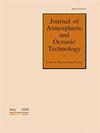Monte Carlo Simulations for Evaluating the Accuracy of Geostationary Lightning Mapper Detection Efficiency and False Alarm Rate Retrievals
IF 1.9
4区 地球科学
Q2 ENGINEERING, OCEAN
引用次数: 4
Abstract
Performance assessments of the Geostationary Lightning Mapper (GLM) are conducted via comparisons with independent observations from both satellite-based sensors and ground-based lightning detection (reference) networks. A key limitation of this evaluation is that the performance of the reference networks is both imperfect and imperfectly known, such that the true performance of GLM can only be estimated. Key GLM performance metrics such as detection efficiency (DE) and false alarm rate (FAR) retrieved through comparison with reference networks are affected by those networks’ own DE, FAR, and spatiotemporal accuracy, as well as the flash matching criteria applied in the analysis. This study presents a Monte Carlo simulation-based inversion technique that is used to quantify how accurately the reference networks can assess GLM performance, as well as suggest the optimal matching criteria for estimating GLM performance. This is accomplished by running simulations that clarify the specific effect of reference network quality (i.e., DE, FAR, spatiotemporal accuracy, and the geographical patterns of these attributes) on the retrieved GLM performance metrics. Baseline reference network statistics are derived from the Earth Networks Global Lightning Network (ENGLN) and the Global Lightning Dataset (GLD360). Geographic simulations indicate that the retrieved GLM DE is underestimated, with absolute errors ranging from 11% to 32%, while the retrieved GLM FAR is overestimated, with absolute errors of approximately 16-44%. GLM performance is most severely underestimated in the South Pacific. These results help quantify and bound the actual performance of GLM and the attendant uncertainties when comparing GLM to imperfect reference networks.基于蒙特卡罗模拟的同步闪电成像仪检测效率和虚警率反演精度评估
地球同步闪电绘图仪(GLM)的性能评估是通过与卫星传感器和地面闪电探测(参考)网络的独立观测结果进行比较进行的。这种评估的一个关键限制是,参考网络的性能既不完美又不完全已知,因此只能估计GLM的真实性能。通过与参考网络的比较获得的关键GLM性能指标,如检测效率(DE)和虚警率(FAR),受到这些网络自身的DE、FAR和时空精度以及分析中应用的闪光匹配标准的影响。本研究提出了一种基于蒙特卡罗模拟的反演技术,用于量化参考网络评估GLM性能的准确性,并提出估计GLM性能的最佳匹配标准。这是通过运行模拟来实现的,这些模拟阐明了参考网络质量(即DE、FAR、时空精度以及这些属性的地理模式)对检索到的GLM性能指标的具体影响。基线参考网络统计数据来自地球网络全球闪电网络(ENGLN)和全球闪电数据集(GLD360)。地理模拟表明,反演的GLM DE被低估,绝对误差在11% ~ 32%之间,而反演的GLM FAR被高估,绝对误差约为16 ~ 44%。全球气候变化监测系统在南太平洋的表现被严重低估。当将GLM与不完全参考网络进行比较时,这些结果有助于量化和约束GLM的实际性能以及随之而来的不确定性。
本文章由计算机程序翻译,如有差异,请以英文原文为准。
求助全文
约1分钟内获得全文
求助全文
来源期刊
CiteScore
4.50
自引率
9.10%
发文量
135
审稿时长
3 months
期刊介绍:
The Journal of Atmospheric and Oceanic Technology (JTECH) publishes research describing instrumentation and methods used in atmospheric and oceanic research, including remote sensing instruments; measurements, validation, and data analysis techniques from satellites, aircraft, balloons, and surface-based platforms; in situ instruments, measurements, and methods for data acquisition, analysis, and interpretation and assimilation in numerical models; and information systems and algorithms.

 求助内容:
求助内容: 应助结果提醒方式:
应助结果提醒方式:


